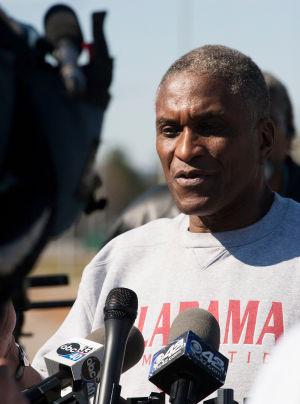
Johnny Ford
Alabama Attorney General Luther Strange repeatedly misstates law in seeking sanctions against Macon County residents for filing a federal lawsuit against him.That is the heart of the residents' response to Strange's motion for sanctions, filed June 5.
Strange says the lawsuit against him and Governor Robert Bentley is frivolous, has no support in the law, and was filed for purposes of harassment--and he claims the plaintiffs and their attorneys should be sanctioned under Rule 11 of the Federal Rules of Civil Procedure (FRCP). But Macon County residents, led by Tuskegee Mayor Johnny Ford, argue in a reply that Strange tramples relevant law in an effort to intimidate them and avoid discovery that could shine light on his financial ties to Indian gaming interests.
Massachusetts attorney Donald LaRoche responded for the plaintiffs in an opposition to sanctions dated July 19, 2013. (See the full opposition at the end of this post.) From the LaRoche filing:
The legal claims in this lawsuit are not barred by clear and on point Supreme Court precedent. On the contrary, the actions of the Defendants in this matter are a blatant violation of the Voting Rights Act of 1965.
Defendant Strange’s Rule 11 letter, dated 4/15/2013, was designed to intimidate the plaintiffs and their counsel. This letter contained a deadline that was not cited anywhere in the rules, demonstrating Attorney General’s Strange propensity to go to any length to strong arm the plaintiffs into submission to his misinterpretation of the law.
How off target is Strange on the law? LaRoche provides plenty of answers to that question. Here are a few of them:
The plaintiffs in the instant case have filed a complaint that has more than a reasonable factual basis. As argued in both the complaint and in the opposition to the defendants’ motion to dismiss, there are no general laws in Alabama which relate to bingo because it can only be authorized in a particular county by constitutional amendment. . . . Attorney General Strange repeatedly states that the plaintiffs’ complaint makes claims that are not “warranted by existing law or by a non-frivolous argument extending, modifying or reversing existing law or for establishing new law.” However, the Attorney General fails to cite any existing law or conclusive precedent to support this contention.
Strange, former Governor Bob Riley, and their allies have repeatedly cited a case styled Barber v. Cornerstone Cmty. Outreach, Inc., 42 So. 3d 65, 86 (Ala. 2009) in their attacks on non-Indian gaming facilities, such as VictoryLand in Macon County. LaRoche takes an intellectual machete to that argument and leaves it in shreds:
The Attorney General cites Barber v. Cornerstone Cmty. Outreach, Inc., 42 So. 3d 65, 86 (Ala. 2009) and Ex parte State of Alabama, _ So.3d _, 20143 WL 765747 (Ala. Mar. 1, 2013) as support for this position that “the Alabama Supreme Court has addressed these ‘bingo’ amendments in multiple counties and these decisions apply statewide.” Barber v. Cornerstone only addressed the bingo constitutional amendment for Lowndes County, Amendment No. 674. . . . The bingo constitutional amendment for Lowndes County is significantly different from the Macon County bingo constitutional amendment. Most importantly, Lowndes County’s sheriff is not constitutionally delegated the authority to promulgate rules and regulations for the operation of bingo in the county as this Court recognized in Hope for Families v Macon County Greyhound Park, Inc., 721 F. Supp. 2d 1079 (M.D. Ala. 2010). The State Supreme Court also recognized in Cornerstone that they “did not adhere to the boundary lines long established in [their] precedent.” Tyson v. Macon County Greyhound Park, 43 So. 3d 587 (Ala. 2010). As such, Cornerstone is inapplicable.
Ex parte State of Alabama is the 2013 case where the Alabama Supreme Court forced Macon County Circuit Judge Thomas Young to approve Strange's petition for a search warrant at VictoryLand. LaRoche shows that Strange's reliance on that case is misguided:
Ex parte State of Alabama is also inapplicable here because it involved a mandamus petition related to the refusal of a circuit judge to issue a search warrant when the circuit judge determined that probable cause did not exist. . . . A determination of the existence of probable cause does not end the inquiry, it only begins it.
Finally, LaRoche shows that the plaintiffs have a firm foundation for their case, and Strange does not meet the standard required for Rule 11 sanctions:
This complaint is not replete with scandalous allegations that have no relevance to the legal claims that plaintiffs are actually trying to make, but puts forth sufficient factual matters with exhibits that are plausible on its face. The plaintiffs’ contentions are that when Defendant General Strange decided what bingo must be and issued his May 2011 memorandum, he usurped the authority which had been vested solely in the Macon County Sheriff. So while General Strange may have the authority to ‘enforce’ bingo regulations or general criminal laws, he does not have the authority to ‘create’ or ‘promulgate’ the rules anymore than he has the authority to ‘create’ or ‘promulgate’ general criminal laws (such authority being vested in the legislature).
Macon Co.--reply to Motion for Sanctions
